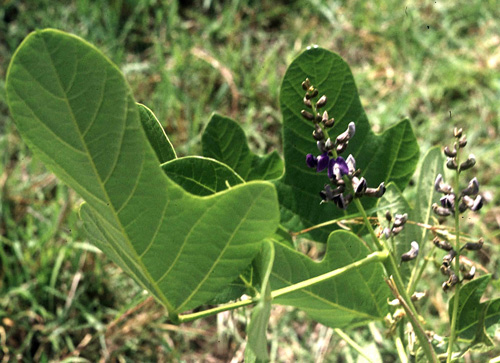Earlier today I was leafing through the latest issue of Kew Scientist, and was interested to read about Kew's work with pesticidal plants in Africa. Providing poorer farmers with environmental benign alternatives to expensive, synthetic pesticides, native species with pesticidal properties are the subject of two newly funded projects which continue Kew's collaboration with the Natural Resources Institute based at the University of Greenwich.
 Work on the value of Tephrosia spp. and Neorautanenia mitis (pictured) against stored and field-grown legume crops in Malawi and Tanzania is being funded by a $400,000 McKnight Foundation project. Local collaboration with researchers at based at the International Centre of Tropical Agriculture (CIAT) and both the Malawi and Tanzanian Departments of Agricultural Research is expected to lead to improvements in harvests and reduced storage losses.
Work on the value of Tephrosia spp. and Neorautanenia mitis (pictured) against stored and field-grown legume crops in Malawi and Tanzania is being funded by a $400,000 McKnight Foundation project. Local collaboration with researchers at based at the International Centre of Tropical Agriculture (CIAT) and both the Malawi and Tanzanian Departments of Agricultural Research is expected to lead to improvements in harvests and reduced storage losses.
The African Dry-land Alliance for Pesticidal Plant Technologies (ADAPPT) is a £1 million Africa Caribbean and Pacific (ACP) Science and Technology project aimed at establishing a network of scientists, NGOs and agricultural technicians across Ghana, Kenya, Malawi, Namibia, South Africa, Tanzania, Zambia, Zimbabwe and the UK to improve research, development and promotion of pesticidal plants. This project should enable the identification and formulation of activities or policies that are critical to sustainable development related to habitat conservation, pesticide regulations, indigenous knowledge and implementing the UN Convention on Biological Diversity.
This work chimes with the efforts over many years of numerous CABI projects aimed at reducing agricultural losses from pests and diseases in Developing Countries, work which is culminating in the development of a global plant health initiative to target such losses. This initiative will integrate CABI's extensive knowledge base with a global network of CABI-trained and accredited plant doctors to deliver crop primary healthcare to the world's most vulnerable farmers.
The CAB Abstracts database has nearly 6000 records on pesticidal plants
